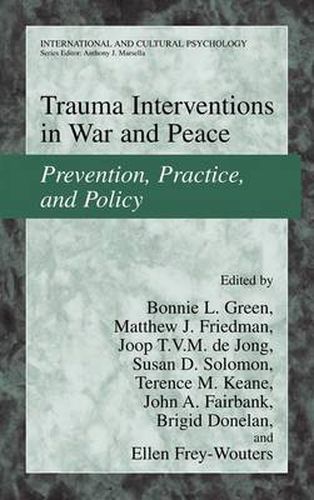Readings Newsletter
Become a Readings Member to make your shopping experience even easier.
Sign in or sign up for free!
You’re not far away from qualifying for FREE standard shipping within Australia
You’ve qualified for FREE standard shipping within Australia
The cart is loading…






This title is printed to order. This book may have been self-published. If so, we cannot guarantee the quality of the content. In the main most books will have gone through the editing process however some may not. We therefore suggest that you be aware of this before ordering this book. If in doubt check either the author or publisher’s details as we are unable to accept any returns unless they are faulty. Please contact us if you have any questions.
With traumatic stress an increasing global challenge, the U.N., the NGO community and goverments must take into account the psychological aftermath of large-scale catastrophes and individual or group violence. This volume addresses this global perspective, and as such it provides a conceptual framework for interventions in the wake of abuse, torture, war, and disaster on individual, local, regional, and international levels. To be useful to both practitioners and policy makers, the book identifies model programmes that can be implemented at every level. These programmes vary in target and intensity to include social policy, safety programmes, public education, coordination, capacity building, training, self-help, counselling, and clinical intervention. A core group of chapters covers the general concepts of traumatic stress, intervention, and social deprivation, while others focus on specific traumatic events like refugees and child abuse in peacetime, each addressing the scope of the problem, reactions to the traumatic stressor, intervention issues, and recommendations. One whole chapter is devoted to caregiver reactions. Special features of the book are the integration of cultural, gender, poverty, and marginalization issues into each discussion, as well as the contributions of internationally noted academic and professional experts. U.N. and NGO personnel provided input and feedback on each chapter to provide the best working guidelines available for those responding to trauma around the world.
$9.00 standard shipping within Australia
FREE standard shipping within Australia for orders over $100.00
Express & International shipping calculated at checkout
This title is printed to order. This book may have been self-published. If so, we cannot guarantee the quality of the content. In the main most books will have gone through the editing process however some may not. We therefore suggest that you be aware of this before ordering this book. If in doubt check either the author or publisher’s details as we are unable to accept any returns unless they are faulty. Please contact us if you have any questions.
With traumatic stress an increasing global challenge, the U.N., the NGO community and goverments must take into account the psychological aftermath of large-scale catastrophes and individual or group violence. This volume addresses this global perspective, and as such it provides a conceptual framework for interventions in the wake of abuse, torture, war, and disaster on individual, local, regional, and international levels. To be useful to both practitioners and policy makers, the book identifies model programmes that can be implemented at every level. These programmes vary in target and intensity to include social policy, safety programmes, public education, coordination, capacity building, training, self-help, counselling, and clinical intervention. A core group of chapters covers the general concepts of traumatic stress, intervention, and social deprivation, while others focus on specific traumatic events like refugees and child abuse in peacetime, each addressing the scope of the problem, reactions to the traumatic stressor, intervention issues, and recommendations. One whole chapter is devoted to caregiver reactions. Special features of the book are the integration of cultural, gender, poverty, and marginalization issues into each discussion, as well as the contributions of internationally noted academic and professional experts. U.N. and NGO personnel provided input and feedback on each chapter to provide the best working guidelines available for those responding to trauma around the world.